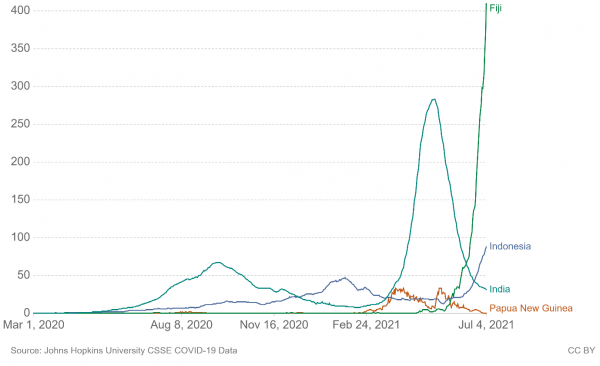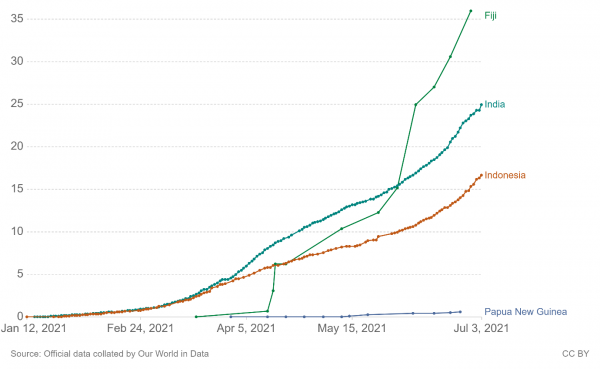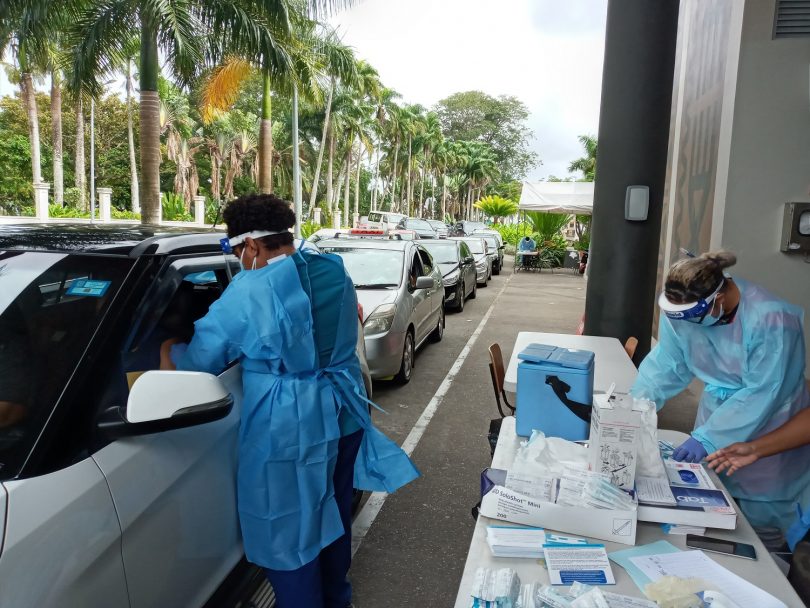Both Fiji and Papua New Guinea (PNG), the Pacific’s two most populous nations, have suffered from the indirect, economic impact of the COVID-19 pandemic over the last year or so. This year was meant to bring hope. But in the last couple of weeks, things have got a lot worse in both countries, albeit in very different ways.
In Fiji, the pandemic is out of control. The figure below shows the 7-day moving average of new cases normalised for population size. Relative to their populations, the number of new cases in Fiji is above the maximum reached by India at the peak of its recent outbreak, and is well above the number currently seen in Indonesia. In fact, according to Our World in Data (5 July), Fiji has the eighth highest per capita average of new cases in the world. Already there are stories of hospitals being full, and worries that the country will run out of oxygen.
Daily new confirmed COVID-19 cases per million people (7-day moving average)
PNG is doing much better to control its outbreak. Although we know that PNG is under-testing, the official number of cases has gone down, and it is widely reported that hospitalisations are down as well.
PNG’s crisis is rather in relation to isolation and vaccination. Again according to Our World in Data (5 July), the country has the seventh lowest vaccination rate in the world, and the lowest outside of Africa. The ratio of vaccines administered to the population is only 0.57 per 100 people; the next lowest, outside of Africa, is Afghanistan at 2.28 per 100 people. Within Africa, only Chad, Democratic Republic of Congo, Burkina Faso, Benin, South Sudan and Cameroon have lower vaccination rates.
Vaccine doses per hundred people 
By contrast, as you can see from the figure above, vaccination is Fiji’s hope. While PNG is administering about 1,000 vaccines a day (which is not much more than the absolute daily growth in population, about 630 a day), Fiji, with a population about one-eighth the size, has pushed its daily vaccination rate up to 6,000. It now has a ratio of vaccines to population of 35%. This is not great by global standards: Fiji sits just outside the top 100 countries by this measure. Still, while there is some vaccine hesitancy, at least the vaccination rate is rising quickly.
Eventually, even if preventative measures fail to quell the outbreak, a rising vaccination rate will do the job – but only after the country has endured an enormous amount of suffering. (The Seychelles presents a sobering vision of what may lie ahead for Fiji before the situation improves. Despite its almost universal vaccination rates, the Seychelles continues to have the highest number of new cases on a per capita basis in the world.)
PNG is facing pain of a different kind. The highly contagious Delta variant, which sparked Fiji’s untamed outbreak, is yet to make an appearance in PNG, at least an official one, but for how long? Authorities recently turned away a chartered flight from India, and have tightened arrival rules – for example, by increasing the quarantine period to 21 days. These measures might be justified to keep the variant out of the community, but will cause further economic isolation and suffering, and will have to be sustained indefinitely if vaccination rates don’t pick up.
And there is just no sign of that happening. One survey found that, excluding health workers, only 39% were willing to be administered a COVID-19 vaccine. Another survey of university students showed that a mere 6% wanted the vaccine. Conspiracy theories abound. Any politician who speaks out in favour of vaccination has to weigh up the unpopularity of the message they are sending. PNG’s opposition leader has called for the vaccine rollout to be suspended. Then there is the fact that PNG is the second least urbanised country in the world – which makes the vaccination task all the more daunting.
For Fiji, much suffering (medical, economic and social) is already being endured, and much more lies ahead. But there is at least a path ahead out of the crisis for Fiji if it can continue pushing up the vaccination rate. PNG, on the other hand, looks destined to be one of the very last countries to emerge from isolation. And, without mass vaccination, there is always the chance – perhaps the likelihood – that the Delta or some other variant will, however tight the isolation measures put in place, eventually take hold and bring to PNG the sort of spike in cases that Fiji is now seeing.
Fiji’s COVID pain is currently more intense than PNG’s, but the latter’s prospects are, if anything, even more worrying.
Note
Data downloaded from Our World in Data on 5 July 2021. The Fijian Ministry has an excellent website with the latest COVID-19 data.
Disclosure
This research was undertaken with support from the Pacific Research Program, funded by the Department of Foreign Affairs and Trade. The views are those of the author only.



It is clear that the situation among different countries in “The Pacific” can be very different. The porous border of PNG with Indonesia means an isolation strategy can not work for long. Moreover, the export and higher education sectors still depend on foreign knowledge workers, which are now in short supply. Tough times ahead.
Thank you those are very valid points. Fiji is now in the top-10 in terms of COVID-19 contagion risk in the world (see: http://bit.ly/harvardtracker). The government has also introduced an open-ended emergency law, which it abuses to clamp down further on the opposition, academics and press. In PNG individual rights of all citizens, especially the poor and powerless, continue to be violated in a more haphazard manner by a venal and violent police force, with promised reforms still behind the horizon.
What makes the isolation strategy for PNG particularly harmful, is their dependence on skilled foreign labour not only for their export sectors, but also for their education and health systems.
PNG universities, for example, which had been put under government control since 2018 and saw a first wave of academics return to their own countries, now find it impossible to attract people to replace them. Since they have refused to connect to broadband internet, and improve their programs, they continue to spew out graduates without the expected competences.
Overall, therefore, universities possibly produce negative value for society and their imminent closure due to COVID-19 panic might be a good thing.
Thanks Stephen. I just want to qualify one statement in your piece:
where you say that in Fiji, the pandemic is out of control. It is out of control in the Lami-Suva-Nausori containment area, but it is still contained elsewhere around the country. So that is both good and bad news. It is good because we have a chance to get ahead of the virus before it takes hold in those areas outside Suva with vaccinations. It is bad because our rate of infection within the broader Suva population is far higher than national level statistics suggest (and that is not even taking into account the non reporting of cases. )
COVID-19 is responsible for at least 3 million excess deaths in 2020. As of 31 December 2020, covid19 had infected over 82 million people and killed more than 1.8 million worldwide. There is only one hope to fight corona: vaccine.
In addition to my earlier comment I wish to add that the Fiji Ministry of Health has just confirmed that a 15 year old girl died of covid-19.
Thanks Stephen. The race in Fiji is between the virus and the vaccine. The virus is ahead in the sprint, but will be beaten in the marathon when vaccinations are complete in the next month or so. It will greatly help if the leaders of or religious organizations – the churches, temples, mosques, gurudwaras, etc. – stood up, stepped forward, and rolled up their sleeves for vaccination of their entire congregation. PNG could give vaccination a head start by doing the same.
While I find that it is important that Fiji makes further progress with vaccination it will not achieve herd immunity. In New Zealand scientific calculations assume that herd immunity can be achieved only if 97 percent of population is fully vaccinated. All over the world many scientists even doubt that herd immunity is possible. Israel, which had been the first country that was considered to have achieved herd immunity, has a new wave of cases now with hundreds of new infections daily. Restriction that were relaxed / abolished were brought in again. .
In Fiji in the end some 65 percent of the population will be fully vaccinated, this is about in October. 35 percent will be unprotected (all those under 18 years). Once vaccination drive has been completed fully and successfully children and teenagers will still be exposed to the virus. So far nobody appears to bother about this huge challenge exposing young people to a severe health risk.
Vaccination is certainly important, but other restrictions as well and here the Fiji government appears too negligent. I have seen pictures from European lockdowns. Streets were empty, people were keeping required distancing. I had asked my wife to bring me some photos from Suva market last Saturday and it appears like a ‘normal’ Saturday, heaps of people, no required distance and the only thing authorities seem to bother is, if people are wearing face marks. This is certainly important, but more needs to be advised.
The force to get vaccinated appears to me to be against the Constitution. I am against such violation of constitution, also because it does not help to create herd immunity. Vaccination provides personal protection, but does not appear to be a strong measure to secure public health (protect the public from covid-19).
In my reading the Constitution is clear. I know that politicians with the help of lawyers can water down the clearest rules, so I would not wonder, if this can happen also here. The constitution says (among others):
11.
[…]
(3) Every person has the right to freedom from scientific or medical treatment or
procedures without an order of the court or without his or her informed consent, or if he or she is incapable of giving informed consent, without the informed consent of a lawful guardian.
This cannot be changed easily. Also OHS law cannot be above the constitution.
2.—(1) This Constitution is the supreme law of the State.
(2) Subject to the provisions of this Constitution, any law inconsistent with this
Constitution is invalid to the extent of the inconsistency.
(3) This Constitution shall be upheld and respected by all Fijians and the State,
including all persons holding public office, and the obligations imposed by this
Constitution must be fulfilled.
(4) This Constitution shall be enforced through the courts, to ensure that––
(a) laws and conduct are consistent with this Constitution;
(b) rights and freedoms are protected; and
(c) duties under this Constitution are performed.
(5) This Constitution cannot be abrogated or suspended by any person, and may
only be amended in accordance with the procedures prescribed in Chapter 11.